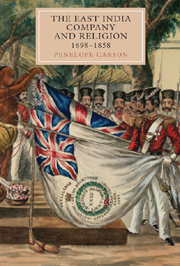Book contents
- Frontmatter
- Contents
- Acknowledgements
- Note on Hinduism
- Abbreviations
- Map of India
- Introduction
- 1 A Christian Company?
- 2 The East India Company, Britain and India 1770–1790
- 3 The 1790s: A Time of Crisis
- 4 The Pillar of Fire Moves Forward: The Advent of British Missionaries 1793–1806
- 5 The Wisdom of the Serpent and the Innocence of the Dove: The Vellore Mutiny and the Pamphlet War 1806–1808
- 6 Troubled Years 1807–1812
- 7 Battle Lines Drawn: Missions, Dissent and the Establishment
- 8 The 1813 Renewal of the Company's Charter: The Religious Public Takes on the Company
- 9 A Turbulent Frontier: The Company and Religion 1814–1828
- 10 A New Dawn? The Era of Lord William Bentinck 1828–1835
- 11 Between Scylla and Charibdis 1836–1858
- Conclusion and Epilogue: Strangers in the Land
- Appendix 1 Presidents of the Board of Control
- Appendix 2 Governors-General and Governors of Madras and Bombay
- Appendix 3 Aide Memoire to Names
- Appendix 4 ‘The Pious Clause’
- Bibliography
- Index
- WORLDS OF THE EAST INDIA COMPANY
3 - The 1790s: A Time of Crisis
Published online by Cambridge University Press: 05 February 2013
- Frontmatter
- Contents
- Acknowledgements
- Note on Hinduism
- Abbreviations
- Map of India
- Introduction
- 1 A Christian Company?
- 2 The East India Company, Britain and India 1770–1790
- 3 The 1790s: A Time of Crisis
- 4 The Pillar of Fire Moves Forward: The Advent of British Missionaries 1793–1806
- 5 The Wisdom of the Serpent and the Innocence of the Dove: The Vellore Mutiny and the Pamphlet War 1806–1808
- 6 Troubled Years 1807–1812
- 7 Battle Lines Drawn: Missions, Dissent and the Establishment
- 8 The 1813 Renewal of the Company's Charter: The Religious Public Takes on the Company
- 9 A Turbulent Frontier: The Company and Religion 1814–1828
- 10 A New Dawn? The Era of Lord William Bentinck 1828–1835
- 11 Between Scylla and Charibdis 1836–1858
- Conclusion and Epilogue: Strangers in the Land
- Appendix 1 Presidents of the Board of Control
- Appendix 2 Governors-General and Governors of Madras and Bombay
- Appendix 3 Aide Memoire to Names
- Appendix 4 ‘The Pious Clause’
- Bibliography
- Index
- WORLDS OF THE EAST INDIA COMPANY
Summary
We think we have an equal right with the missionary, sent from the English Society for Propagating the Gospel.
(R. Haldane)Grant's Mission Scheme
CHARLES GRANT returned home from India in 1790 after 22 years' service determined to make progress with the 1786 missionary proposal discussed in the previous chapter. Unhappy with the reception the scheme had received from Lord Cornwallis in India, Grant set about trying to obtain more support for it in Britain. He had already sent a copy of the proposal to William Wilberforce, MP and personal friend of William Pitt, the Prime Minister. They soon met and thus began a close friendship, which was to have a considerable impact on the Company once Wilberforce had taken up the cause of Christianising India. In 1785 Wilberforce, like Grant earlier, had undergone an Evangelical conversion experience, which changed the direction of his life. Henceforward, his Christian beliefs would regulate everything he did and give urgency to his attempts to rectify a myriad of social and moral evils. His health was poor, yet he was able to direct his attention effectively for a long period over a wide range of issues. Wilberforce was a mesmerising speaker and was held in affection and esteem by most who had dealings with him. At the time he met Grant, he was immersed in trying to get a motion for the abolition of the slave trade through Parliament. Grant's role as one of Wilberforce's ‘most trusted lieutenants’ in the abolition cause did not, however, deflect him from India.
- Type
- Chapter
- Information
- The East India Company and Religion, 1698-1858 , pp. 34 - 51Publisher: Boydell & BrewerPrint publication year: 2012



